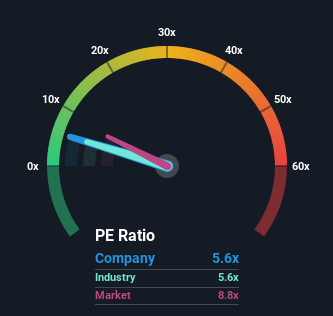- South Africa
- /
- Industrials
- /
- JSE:KAP
Fewer Investors Than Expected Jumping On KAP Industrial Holdings Limited (JSE:KAP)

KAP Industrial Holdings Limited's (JSE:KAP) price-to-earnings (or "P/E") ratio of 5.6x might make it look like a buy right now compared to the market in South Africa, where around half of the companies have P/E ratios above 9x and even P/E's above 14x are quite common. Nonetheless, we'd need to dig a little deeper to determine if there is a rational basis for the reduced P/E.
KAP Industrial Holdings could be doing better as it's been growing earnings less than most other companies lately. The P/E is probably low because investors think this lacklustre earnings performance isn't going to get any better. If you still like the company, you'd be hoping earnings don't get any worse and that you could pick up some stock while it's out of favour.
View our latest analysis for KAP Industrial Holdings

How Is KAP Industrial Holdings' Growth Trending?
KAP Industrial Holdings' P/E ratio would be typical for a company that's only expected to deliver limited growth, and importantly, perform worse than the market.
If we review the last year of earnings growth, the company posted a worthy increase of 12%. Pleasingly, EPS has also lifted 58% in aggregate from three years ago, partly thanks to the last 12 months of growth. Accordingly, shareholders would have probably welcomed those medium-term rates of earnings growth.
Shifting to the future, estimates from the two analysts covering the company suggest earnings should grow by 7.6% each year over the next three years. That's shaping up to be similar to the 7.7% per annum growth forecast for the broader market.
In light of this, it's peculiar that KAP Industrial Holdings' P/E sits below the majority of other companies. It may be that most investors are not convinced the company can achieve future growth expectations.
What We Can Learn From KAP Industrial Holdings' P/E?
While the price-to-earnings ratio shouldn't be the defining factor in whether you buy a stock or not, it's quite a capable barometer of earnings expectations.
Our examination of KAP Industrial Holdings' analyst forecasts revealed that its market-matching earnings outlook isn't contributing to its P/E as much as we would have predicted. There could be some unobserved threats to earnings preventing the P/E ratio from matching the outlook. At least the risk of a price drop looks to be subdued, but investors seem to think future earnings could see some volatility.
We don't want to rain on the parade too much, but we did also find 2 warning signs for KAP Industrial Holdings (1 is significant!) that you need to be mindful of.
If P/E ratios interest you, you may wish to see this free collection of other companies that have grown earnings strongly and trade on P/E's below 20x.
Valuation is complex, but we're here to simplify it.
Discover if KAP might be undervalued or overvalued with our detailed analysis, featuring fair value estimates, potential risks, dividends, insider trades, and its financial condition.
Access Free AnalysisHave feedback on this article? Concerned about the content? Get in touch with us directly. Alternatively, email editorial-team (at) simplywallst.com.
This article by Simply Wall St is general in nature. We provide commentary based on historical data and analyst forecasts only using an unbiased methodology and our articles are not intended to be financial advice. It does not constitute a recommendation to buy or sell any stock, and does not take account of your objectives, or your financial situation. We aim to bring you long-term focused analysis driven by fundamental data. Note that our analysis may not factor in the latest price-sensitive company announcements or qualitative material. Simply Wall St has no position in any stocks mentioned.
About JSE:KAP
KAP
Engages in industrial, chemical, and logistics businesses in South Africa, rest of Africa, the Americas, Europe, the Middle East, and Australasia.
Undervalued with proven track record.
Similar Companies
Market Insights
Community Narratives




